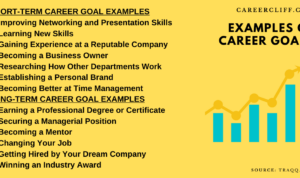Career Development Goals sets the stage for this enthralling narrative, offering readers a glimpse into a story that is rich in detail with american high school hip style and brimming with originality from the outset.
Embark on a journey to explore the realm of career development goals, where aspirations meet strategic planning in a quest for professional growth and success.
Importance of Setting Career Development Goals

Setting clear career development goals is crucial for professional growth as it provides a roadmap for individuals to follow in their career journey. Without defined goals, it can be challenging to measure progress and stay motivated.
Increased Motivation and Productivity, Career Development Goals
- Having well-defined career goals gives individuals a sense of purpose and direction, leading to increased motivation to work towards achieving those goals.
- Clear goals can also help individuals prioritize tasks and focus on what truly matters, resulting in improved productivity.
- When individuals see progress towards their goals, it reinforces their motivation and drives them to continue working hard.
Focus and Progression
- Setting goals helps individuals focus their efforts on specific areas that are aligned with their desired career path.
- By breaking down larger career goals into smaller, manageable tasks, individuals can make steady progress and track their development over time.
- Having a clear direction through goal-setting allows individuals to make informed decisions and take steps towards advancing their careers.
Types of Career Development Goals
Setting career development goals can encompass various categories that are crucial for personal and professional growth. Here, we will delve into different types of career development goals and their significance.
Skills Development Goals
Skills development goals focus on enhancing specific abilities or acquiring new skills to excel in your current role or prepare for future opportunities. This may include improving communication skills, leadership qualities, technical expertise, or industry-specific knowledge.
- Enrolling in training programs or workshops to enhance a particular skill set.
- Obtaining certifications or licenses relevant to your field.
- Participating in mentorship programs to gain valuable insights and guidance.
Promotion Goals
Promotion goals entail aiming for advancement within your current organization or seeking higher positions elsewhere. These goals often involve demonstrating leadership capabilities, exceeding performance expectations, and showcasing potential for growth.
- Setting a timeline for achieving a managerial position within your department.
- Increasing responsibilities and taking on challenging projects to showcase readiness for promotion.
- Networking with key decision-makers to explore promotion opportunities within or outside the company.
Job Change Goals
Job change goals revolve around transitioning to a new role, industry, or organization to further career aspirations. These goals require careful planning, research, and preparation to ensure a smooth and successful transition.
- Identifying industries or companies aligned with your long-term career objectives.
- Updating your resume, LinkedIn profile, and professional network to attract job opportunities.
- Preparing for interviews by highlighting transferable skills and showcasing adaptability to new environments.
Entrepreneurship Goals
Entrepreneurship goals involve venturing into business ownership, startups, or freelance work to pursue passion projects, create innovative solutions, or achieve financial independence. These goals require a unique set of skills, resources, and risk-taking abilities.
- Developing a business plan outlining the mission, target market, and revenue model.
- Securing funding or investment for launching a startup or expanding an existing business.
- Building a strong brand presence through marketing strategies, networking efforts, and customer engagement.
Setting a combination of short-term and long-term career development goals is essential for maintaining focus, motivation, and progress in your professional journey.
Significance of Short-Term and Long-Term Goals
Short-term goals provide immediate direction and tangible milestones to track progress, while long-term goals offer a vision for future success and guide strategic planning. Balancing both types of goals ensures continuous growth and adaptability in the ever-evolving career landscape.
Importance of SMART Goals
Setting specific, measurable, achievable, relevant, and time-bound (SMART) goals enhances career planning by providing clarity, accountability, and actionable steps towards success. SMART goals help in prioritizing tasks, monitoring performance, and adjusting strategies to stay on course for achieving career milestones.
Strategies for Achieving Career Development Goals
Setting career development goals is just the first step. To actually achieve these goals, you need to have a clear strategy in place. Here are some key strategies to help you align your career goals with your strengths, interests, and values, as well as tips for continuous learning, networking, seeking mentorship, and overcoming obstacles.
Aligning Career Goals with Individual Strengths, Interests, and Values
It is crucial to align your career goals with your strengths, interests, and values to ensure long-term satisfaction and success in your chosen field. Here are some strategies to help you do that:
- Conduct a self-assessment to identify your strengths, interests, and values.
- Research different career paths that align with your identified strengths, interests, and values.
- Set specific and achievable career goals that reflect your unique attributes.
Continuous Learning, Networking, and Seeking Mentorship
Continuous learning, networking, and seeking mentorship are essential in achieving career development goals. Here are some tips to help you in these areas:
- Stay updated on industry trends and developments through courses, workshops, and seminars.
- Build a strong professional network by attending industry events and connecting with professionals in your field.
- Seek out mentors who can provide guidance, support, and valuable insights to help you progress in your career.
Overcoming Obstacles and Staying Resilient
Obstacles are inevitable on the path to achieving your career goals. Here are some tips to help you overcome challenges and stay resilient:
- Develop a positive mindset and see obstacles as opportunities for growth and learning.
- Seek support from friends, family, or colleagues during tough times.
- Stay adaptable and flexible in your approach, and be willing to make adjustments to your goals when needed.
Evaluating and Adjusting Career Development Goals

Regularly reviewing and assessing progress towards career goals is crucial for ensuring that you stay on track and make necessary adjustments to achieve success in your chosen field. By evaluating your goals, you can identify areas of improvement, track your achievements, and adapt your objectives as needed.
Methods for Tracking Achievements
- Keep a detailed journal or digital log of your accomplishments, milestones, and setbacks.
- Create a vision board or visual representation of your goals to stay motivated and focused.
- Utilize productivity tools and apps to monitor your progress and set reminders for deadlines.
Identifying Areas for Improvement
- Solicit feedback from mentors, colleagues, or supervisors to gain valuable insights into areas where you can grow.
- Conduct self-assessments to reflect on your strengths and weaknesses, and determine areas that require development.
- Seek out additional training, courses, or certifications to enhance your skills and knowledge in areas of improvement.
Adjusting Goals Accordingly
- Be flexible and open to modifying your goals based on changing circumstances or new opportunities that arise.
- Set realistic timelines and milestones for achieving your adjusted goals to maintain motivation and focus.
- Regularly revisit and reassess your career development plan to ensure that your goals remain relevant and aligned with your long-term aspirations.



